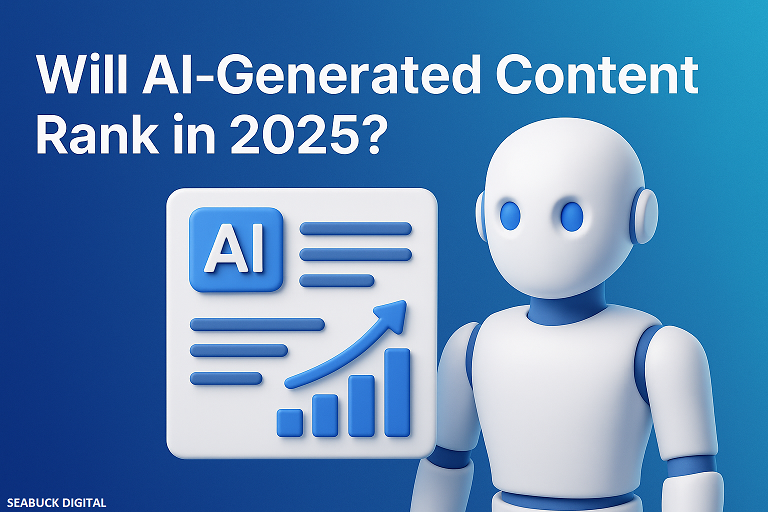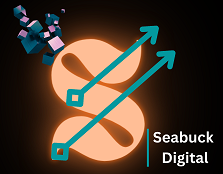
Introduction
Welcome to the future—where content isn’t just king, it’s now AI-powered royalty. But here’s the real question: will AI-generated content actually rank in 2025? Or will search engines sniff it out and shove it into the internet’s forgotten corners? You’re not alone if you’re wondering this. Let’s break it down.
The AI Boom and Content Creation
AI has completely shaken up how we create content. From blog posts to product descriptions to entire ebooks, AI tools like ChatGPT, Jasper, and Copy.ai are pumping out thousands of words in seconds.
Why This Question Matters Now
Because everyone—from solo bloggers to enterprise marketers—is jumping on the AI train. But Google’s algorithm updates? They’re no joke. So understanding where AI fits in is critical.
What is AI-Generated Content?
Brief History of AI Writing Tools
Back in 2020, GPT-3 made waves. Fast-forward to 2025, and we now have GPT-5, Claude, Gemini, and dozens of niche AI tools. They’re faster, more accurate, and terrifyingly good at mimicking human tone.
How AI Content Works in 2025
AI pulls from massive datasets and learns patterns. It generates content based on prompts, context, and language models. The latest models even adjust tone and structure to sound “more human.”
Google’s Stance on AI Content
E-E-A-T Explained
Google’s ranking guidelines revolve around Experience, Expertise, Authoritativeness, and Trustworthiness—aka E-E-A-T. It’s not just about what’s said, but who says it and how it’s said.
What E-E-A-T Really Means
- Experience: Do you know this topic first-hand?
- Expertise: Are you qualified to write about it?
- Authoritativeness: Are others linking and referring to you?
- Trustworthiness: Can people trust your content?
Helpful Content System Update
Google’s Helpful Content updates are designed to reward people-first content and punish anything overly generic, robotic, or purely SEO-focused.
Google’s Official Statements About AI-Generated Content
Google has clarified: It’s not how content is created, but whether it’s helpful. AI content can rank—but only if it’s valuable, unique, and high-quality.
Human vs AI Content: Key Differences
Creativity and Context
Humans understand subtle humor, sarcasm, and nuanced storytelling. AI? Still learning.
Depth and Original Insight
Real-world experience can’t be faked. AI lacks lived insights—those stories, case studies, and lessons learned over time.
Tone, Voice, and Empathy
AI mimics tone, but emotional resonance? That’s still a human superpower.
Does AI-Generated Content Currently Rank?
Case Studies from 2023-2024
Many affiliate blogs, niche sites, and even news sites ranked with AI content—until the Google updates hit. Then? A lot of those sites tanked.
Examples of High-Ranking AI Content
Sites that blend AI with human editing, fact-checking, and EEAT elements have seen success. AI doesn’t have to be bad—when used wisely, it’s powerful.
Red Flags That Get AI Content Penalized
- Repetition
- Generic phrasing
- Keyword stuffing
- No author attribution
- Thin or spun content
How Search Engines Detect AI Content
AI Content Detectors and Their Role
Google likely uses detectors similar to GPTZero or Originality.ai. They’re not perfect, but they spot repetitive patterns and lack of depth easily.
Google’s Use of Machine Learning in Quality Detection
Search engines are smarter than ever. They measure user behavior—click-through rates, time on page, bounce rate, and more—to judge quality.
Common Signals of Low-Quality AI Content
- Lack of topic focus
- Irrelevant or outdated information
- No expert quotes or unique points
Best Practices to Make AI Content Rank in 2025
Hybrid Content Approach: AI + Human Touch
Let AI do the heavy lifting, but bring in a human to polish it. Add personality, fix awkward phrasing, and fact-check.
Fact-Checking, Linking, and Formatting
Include outbound links to authority sites, cite sources, use bullet points, add images—make it skimmable and trustworthy.
Adding Personal Experience and Author Bio
Include an author name with credentials, maybe a short bio, and personal commentary or examples. That’s your EEAT goldmine.
The Role of Originality and Topical Authority
Building Topical Relevance Over Time
Google rewards sites that cover a topic deeply—not just shallow overviews. Create content clusters and internal linking strategies.
Using AI as a Supporting Tool, Not a Replacement
AI is your assistant, not your ghostwriter. It supports your ideas, not replaces them.
The Rise of AI SEO Tools and Optimization
Tools That Help AI Content Rank
Real-Time SEO Optimization with AI
You can now optimize while writing. Tools give you NLP terms, heading suggestions, and even competitor gap analysis.
From Keyword Stuffing to Semantic Relevance
Google’s moved past keyword repetition. AI tools now help you write around a topic, covering intent and context.
Future Trends: What to Expect Beyond 2025
Smarter Algorithms and Higher Standards
Search engines will get more ruthless. Thin AI content won’t stand a chance.
Real-Time User Feedback Signals
Google will weigh engagement more—scroll depth, clicks, user interactions. Writing for readers will matter more than ever.
Interactive and Dynamic Content
Think quizzes, calculators, interactive charts—AI might write the content, but engagement tools will make it rank.
Ethical Concerns and Content Authenticity
Deepfakes, Misinformation, and Bias
AI can be dangerous if misused. Always verify your facts, and never pass off AI content as personal experience.
The Importance of Clear Disclosure
Readers trust transparency. Mention that AI helped, but highlight the human involvement.
Industries Benefiting Most from AI Content
Affiliate Marketing
Fast content creation for comparison posts and reviews.
E-commerce Product Descriptions
Generate thousands of SKUs quickly and optimize them for search.
News Aggregators and Content Curation
Summarize breaking stories in seconds.
What Content Should Still Be Written by Humans?
Personal Stories and Opinion Pieces
AI can’t share your life experience. People connect to people.
Content Requiring Empathy and Nuance
Healthcare, legal advice, therapy topics—leave these to the pros.
Will AI-Generated Content Rank in 2025? Final Verdict
The Yes, the No, and the Depends
- Yes, if it’s helpful, accurate, and polished.
- No, if it’s lazy, repetitive, or written just for SEO.
- It depends on how you use AI—not whether you use it.
Conclusion
AI-generated content can rank in 2025—but only when it meets the same quality standards as human-written content. Blend creativity with strategy, and you’ve got a winning formula. Don’t fear AI—learn to work with it, and you’ll stay ahead of the curve.
FAQs
Can I publish only AI content and still rank?
Yes, but it needs to be high-quality, original, and demonstrate value to the reader. Thin, low-value AI content won’t survive Google’s updates.
What tools help optimize AI-written content?
Surfer SEO, Frase, NeuronWriter, and Clearscope are great tools for improving on-page SEO in real time.
Is AI content detectable by Google?
Not directly—but Google detects patterns, engagement, and quality signals. If your content lacks depth or originality, it may be flagged.
How can I blend AI content with human input?
Use AI to create drafts, outlines, or initial versions—then have a human edit for tone, clarity, facts, and EEAT factors.
Is AI content good for all niches?
No. It works best for product reviews, tutorials, and listicles. Avoid AI-only content in sensitive fields like finance, law, or medicine without expert input.
Read More:
Affiliate Roundups That Rank in AI Search
Keyword Clustering for Affiliate SEO

